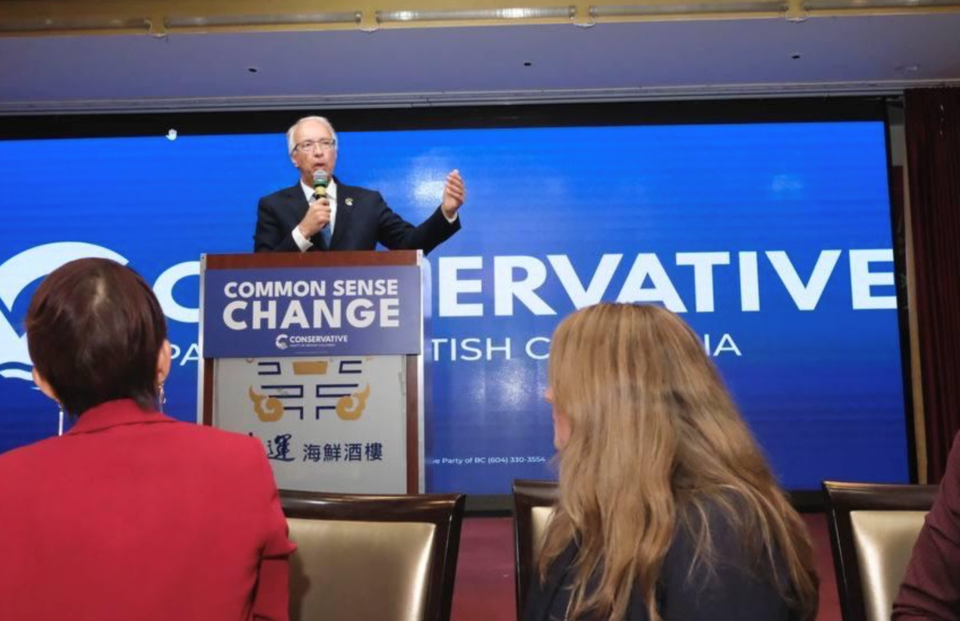Do B.C. politicians need to be paid more?
I’ll give you a moment to finish yelling “NO!” at your computer screen.
It’s okay. Let it out. This is a safe space.
Now, let's hear a counterpoint. It comes from Opposition BC Conservative Leader John Rustad: “I’ll put it in very crude terms: You pay peanuts, you get monkeys.”
The annual MLA salary of $119,533 is hardly bananas in a province where the median family income was $101,520 as of 2022. But Rustad’s argument, first articulated in that zinger of a quote to The Globe and Mail earlier this month, is that the amount still isn’t enough to attract a young professional into the brutal world of politics.
“For those people that are in their middle years, whether it's in the mid-30s to maybe even to the early 50s, those are the prime earning years for people, and if you want those kind of people, professionals with the experience to enter into the business, you need to be able to compensate them accordingly,” Rustad said Thursday.
Without attractive pay, political life is otherwise confined to those who are already wealthy or those retired and looking for something else to do, he said.
Rustad’s proposal earned him much mockery from BC NDP house leader Mike Farnworth on Thursday, whose side introduced a bill Monday to freeze MLA pay for a year during the U.S. tariff dispute. That meant politicians forgo a 2.6 per cent cost of living increase that would have added another $3,108 to their wallets this month.
“The leader of the Opposition seems to have different priorities, which is about compensation for his own MLAs,” said Farnworth. “We're confident that, I think the people would agree with us, that we are well paid and that this was an appropriate decision to make.”
Publicly confident, yes. But privately, I gather, there was a good deal of grumbling within the NDP caucus at the prospect of what is the third pay freeze in the last five years. And there’s support on that side of the aisle for higher MLA pay too.
Perhaps that has something to do with the massive raises Premier David Eby’s office keeps giving to political staff, to the point that the aides who carry the ministers’ binders down the hallway now make more than backbencher MLAs, and senior communications strategists get a bigger paycheque than the cabinet ministers they advise.
The rationale from NDP strategists is that it’s hard for young staffers to live on a wage of below $120,000 in Victoria. And they have a point. Housing costs in the capital city are amongst the highest in North America. Even at that wage, you are barely living comfortably in Victoria or Vancouver.
For politicians, though, the optics are always different. The public has an expectation that getting elected is a public service, not a career. And with trust in politics at record-low levels, and the cost of living continuing to skyrocket for ordinary people, it’s hard to mount a steady defence for using public funds to increase political pay.
Besides, the base pay is hardly what most MLAs actually earn. The premier gets a top-up to $227,112 and ministers to $179,299. All other NDP MLAs get additional amounts as part of other roles, including caucus leadership. Even the two Greens earn $30,000 and $12,000 in additional pay. It’s only the Opposition backbenchers who get stuck at the base amount.
Rustad’s proposal is for an independent group to come in and set higher MLA salaries. He suggested leaders from the private sector, former politicians and members of the judiciary. That already happened years ago when a review resulted in legislation to enshrine annual cost-of-living increases, in the hopes it would depoliticize the issue. Alas, it did not.
B.C.’s base salaries appear largely in line with that of other provinces. It’s in the ballpark of Alberta, where MLAs earn $120,936, and Ontario, where the rate is $116,550. Some provinces pay less, like the $74,634 in Prince Edward Island. Others pay more, like the $131,766 in Quebec.
Federal MPs earn significantly more, at $211,000 base pay — though, they also face significantly more travel time criss-crossing the country.
Rustad suggested MLA pay be tied to fluctuations in the “average wage” for British Columbians, to incentivize politicians to grow the economy to also grow their own pay.
Sounds good, but it might actually result in politicians getting even steeper increases. MLAs received a 3.9 per cent cost-of-living increase in 2024, but it would have been 6.54 per cent if it was based on average wages like Rustad suggested.
Which brings us back to peanuts and political rhetoric.
“One could say there are a lot of howling monkeys on the other side,” said Farnworth. “But I won’t say that.”
“Is there a way to keep monkeys out of the legislature?” Rustad was asked by a reporter.
Rustad deadpanned: “That’s up to the electorate to decide.”
In more ways than one — including on the appetite to increase paycheques for politicians.
Rob Shaw has spent more than 17 years covering B.C. politics, now reporting for CHEK News and writing for Glacier Media. He is the co-author of the national bestselling book A Matter of Confidence, host of the weekly podcast Political Capital, and a regular guest on CBC Radio.
[email protected]
🚨New newsletter alert! Stay ahead of the curve in B.C. politics. Get expert political analysis delivered straight to your inbox, plus inside scoops and other stories from across the province.
Sign up here for the Capital & Coast newsletter.



